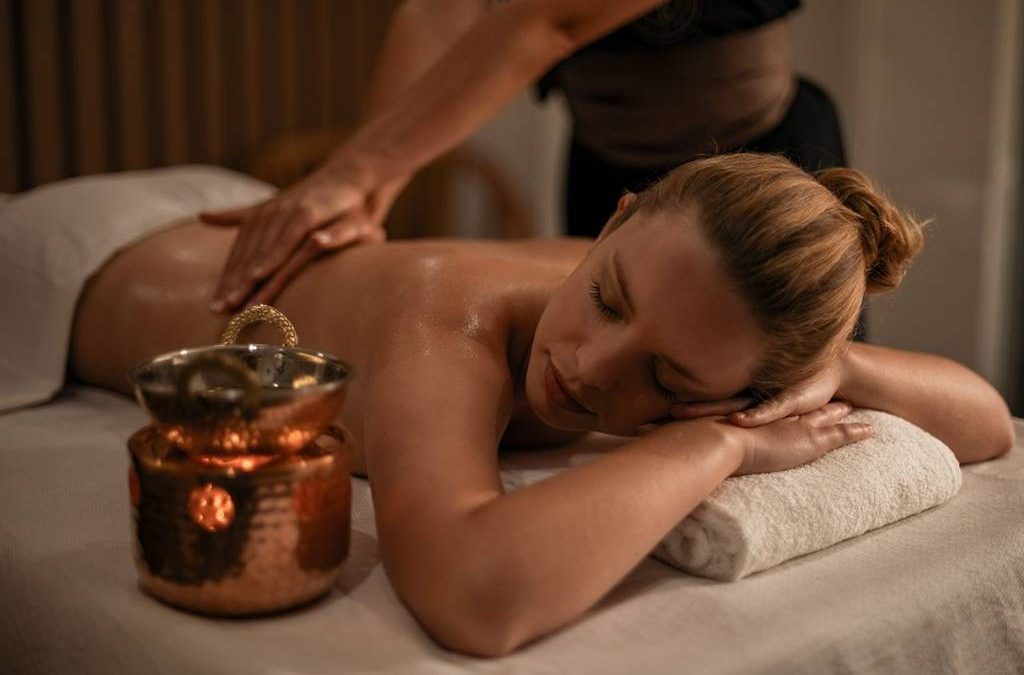The main difference between an Ayurvedic spa and a normal spa lies in the approach and treatments offered. Here are some key distinctions:
- Philosophy and Approach:
Ayurvedic Spa: Ayurveda is an ancient Indian holistic healing system that focuses on balancing the mind, body, and spirit. Ayurvedic spas incorporate Ayurvedic principles into their treatments, emphasizing the balance of energies and the promotion of overall well-being.
Normal Spa: Normal spas generally prioritize relaxation, stress relief, and pampering. While they may offer therapeutic benefits, their approach is typically not rooted in any specific holistic healing system.
Ayurvedic Spa vs Normal Spa Treatment Techniques:
Ayurvedic Spa: Ayurveda spa utilize traditional Ayurvedic techniques, including specific massage techniques, herbal treatments, and specialized therapies such as Shirodhara (pouring of warm oil on the forehead) and Panchakarma (detoxification and rejuvenation therapies). Treatments are tailored to individual doshas (body types) and focus on restoring balance and vitality.
Normal Spa: Normal spas typically offer a range of treatments like Swedish massage, deep tissue massage, aromatherapy, facials, body scrubs, and similar services that aim to relax and rejuvenate without following specific holistic principles.
Herbal and Natural Products:
Ayurvedic Spa: Ayurveda spa often use herbal oils, powders, and other natural products based on Ayurvedic principles. These products are selected based on individual doshas and are believed to have therapeutic benefits.
Normal Spa: Normal spas may use a variety of beauty and skincare products, including both natural and commercially available ones, without specific focus on Ayurvedic principles.
- Personalized Approach:
Ayurvedic Spa: Ayurvedic spas typically assess an individual’s dosha or body type and provide personalized treatments and recommendations based on their specific needs and imbalances.
Normal Spa: While normal spas may offer some customization based on client preferences, they generally provide standardized treatments and services without the same level of personalized assessment.
Benefits of Ayurveda Massage
Ayurvedic spas offer a range of benefits that promote overall well-being and balance. Here are some potential benefits of Ayurvedic spa treatments:
- Stress Relief: Ayurveda spa treatments are designed to induce relaxation and alleviate stress. Techniques such as specialized massages, herbal therapies, and aromatherapy help calm the nervous system, reduce anxiety, and promote a sense of tranquility.
- Detoxification: Ayurveda spas often incorporate detoxification therapies known as Panchakarma. These treatments aim to eliminate toxins from the body, purify the system, and restore the body’s natural balance.
- Improved Circulation: Ayurvedic massages and therapies involve specific techniques that stimulate blood circulation and lymphatic flow. This can improve oxygen and nutrient supply to the cells, enhance tissue repair, and aid in the removal of waste products from the body.
- Enhanced Skin Health: Ayurveda spa often use natural herbal preparations and Ayurvedic techniques to promote healthy skin. Treatments like herbal facials, body scrubs, and oil massages can improve skin texture, nourish the skin, and impart a natural glow.
- Balancing of Energies: Ayurveda emphasizes the balance of three fundamental energies or doshas: Vata, Pitta, and Kapha. Ayurvedic spa treatments aim to restore the balance of these energies in the body, which is believed to promote optimal health, vitality, and emotional well-being.
- Improved Sleep Quality: Many Ayurveda spa treatments have a calming effect on the mind and body, which can help alleviate insomnia and improve sleep quality. Techniques like Shirodhara (pouring of warm oil on the forehead) and Ayurvedic herbal remedies may promote relaxation and induce restful sleep.
- Pain Relief: Ayurvedic therapies such as Abhyanga (oil massage) and Pizhichil (warm oil treatment) can help reduce muscular tension, alleviate joint pain, and provide relief from conditions like arthritis and back pain.
- Increased Energy and Vitality: Ayurveda spa treatments aim to harmonize the body and mind, restoring energy and vitality. By promoting relaxation, balancing energies, and detoxifying the body, individuals may experience increased stamina, improved focus, and an overall sense of rejuvenation.
Beneficial Ayurveda Oils
Ayurvedic massages often incorporate the use of specific oils based on individual needs and doshas (body types). Here are some commonly used oils in Ayurvedic massage and their associated benefits:
- Sesame Oil (Til Oil): Sesame oil is a versatile and widely used oil in Ayurvedic massages. It is considered warming and nourishing, making it suitable for most body types. Sesame oil can help alleviate joint pain, promote relaxation, improve circulation, and nourish the skin.
- Coconut Oil: Coconut oil is cooling and soothing, making it beneficial for individuals with Pitta dosha or those experiencing heat-related imbalances. It moisturizes the skin, improves skin texture, and has a calming effect on the body and mind.
- Almond Oil: Almond oil is nourishing, light, and easily absorbed by the skin. It is suitable for most doshas and can help moisturize and soften the skin. Almond oil is also believed to promote relaxation and improve mental clarity.
- Brahmi Oil: Brahmi oil is made from the herb Brahmi (also known as Gotu Kola). It is traditionally used in Ayurveda to calm the mind, reduce anxiety, and improve mental focus. Brahmi oil is often used in head massages to promote relaxation and alleviate stress.
- Bhringraj Oil: Bhringraj oil is made from the herb Bhringraj (Eclipta alba) and is commonly used in Ayurveda for hair and scalp treatments. It is believed to promote hair growth, strengthen hair follicles, and improve scalp health. Bhringraj oil is often used in scalp massages to nourish the hair and support healthy hair growth.
- Jojoba Oil: Jojoba oil is a light and non-greasy oil that closely resembles the natural sebum produced by the skin. It is suitable for most skin types and is often used in Ayurvedic facial massages. Jojoba oil moisturizes the skin, helps maintain its natural balance, and can assist in reducing signs of aging.
- Ashwagandha Oil: Ashwagandha oil is derived from the herb Ashwagandha (Withania somnifera) and is known for its rejuvenating and calming properties. It is often used in Ayurveda spa massages to promote relaxation, reduce stress, and support overall well-being.
